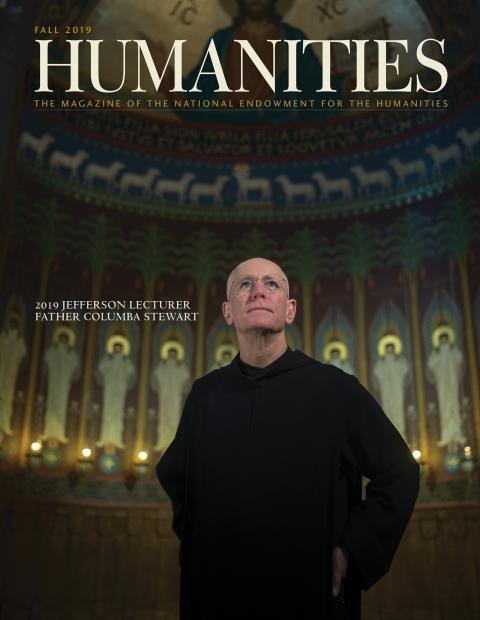With this issue we celebrate the 2019 Jefferson Lecturer in the Humanities, Father Columba Stewart, scholar of early Christianity and executive director of the Hill Museum & Manuscript Library (HMML).
More than fifty years after its founding (and almost as many years since its first NEH grant), HMML’s project of photographing religious manuscripts, including many endangered by conflict, continues apace, long unbounded by the limits of once Catholic Europe.
HMML today is an ecumenical marvel, serenely crossing borders that divide nations and religions. As a library, it is in a class by itself, granting online access to what is considered the largest collection of religious manuscripts in the world.
Fr. Columba, who is a Benedictine monk, is also an important scholar of early Christianity. In an interview with NEH Chairman Jon Parrish Peede, he talks about the monastic experience as a witness and a historian. He also talks about books, cultural preservation, and the original Saint Columba for whom he is named.
This issue of Humanities highlights a sampling of NEH’s own contributions to the preservation of religious traditions. From the King James Bible to the Dead Sea Scrolls to early Buddhist manuscripts, records of many traditions are digitized, transcribed, translated, published, analyzed, and circulated with the support of NEH grants.
Nor are religious traditions, per se, the only traditions NEH grants help preserve. In a visit to UC Berkeley, Xiaxun Ding learns how optical-scanning technology is being used to recover sound recordings of Native American songs and stories from mold-eaten wax cylinders and how such work is supporting broader efforts to help Native American communities revitalize their linguistic cultures.
The human part of the humanities is also apparent in the evolution of public libraries, whose business these days goes way beyond books. Jennifer Howard takes a look at how public libraries today are supporting programs from literacy training to emergency services to tai chi.
Another major humanities event anticipated by this issue is the National Humanities Conference, taking place this November in Honolulu. This annual conference brings together humanities councils from across the country and U.S. territories, all of whom receive operational grants from NEH and support local humanities programming. This year’s hosts are the humanities councils of Hawaii, Guam, Northern Marianas, and Amerika Samoa.

